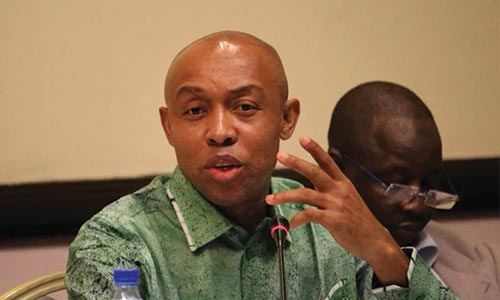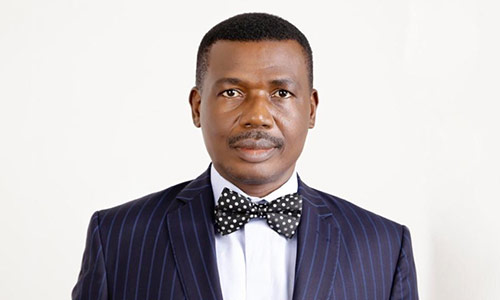All Eyes on the Judiciary Ahead of 2023 Elections

As important as the judiciary is to the sustenance of the rule of law and democracy, so much will be expected from this all-important arm of the government ahead of the 2023 elections, with searchlights also beamed at it, writes Davidson Iriekpen
Despite seeking to explore an out-of-court settlement with a retired judge of the Lagos High Court, Justice Babajide Candide-Johnson, who instituted a lawsuit before a National Industrial Court of Nigeria (NICN) against the Lagos State Government, more retired judges have also joined their colleagues to sue the state for the non-payment of their pensions, severance gratuities and other entitlements, a year after retirement.
Recall that Justice Candide-Johnson had filed a suit before NICN, demanding his pension, severance gratuity and other entitlements from the Lagos State government, a year after his retirement. He is also seeking an order directing the Lagos State Governor, Babajide Sanwo-Olu to forthwith calculate his pension based on the provisions of Section 291 (2) and (3a-c) of the 1999 Constitution as well as Section 2 of the Pensions Rights of Judges Act to pay him the sum of N21,145,551.6.
He also wants the court to award the sum of N10 million as general damages for failure to pay his pension and gratuity in accordance with the law.
Justice Candide-Johnson was appointed by the Governor of Lagos on May 22, 2001, and sworn into office on May 24 of the same year. He spent 20 years on the bench and retired on June 27, 2021, having attained the mandatory retirement age of 65.
In the documents before the court, the retired judge said during his years of service, he was enrolled in the contributory pension scheme of the Civil Service of Lagos State. Consequent upon this enrollment, several sums were deducted from his monthly salary by the Lagos State Government as his contribution to his pension.
In accordance with the provisions of the constitution, and the Pension Rights of Judges Act, he is entitled to a minimum lifetime pension of N21,145,551.6. In addition, the retired judge said upon his retirement in June 2021, he was entitled to be paid and to receive 300 per cent of his annual basic salary while in office by virtue of the Certain Political, Public, and Judicial Office Holders (Salaries and Allowances, Amendment Act of 2008.
He said despite these abundantly clear and instructive provisions of the law, the Lagos State Government has failed to comply strictly with the provisions of the constitution and the Pensions Rights of Judges in ensuring that his pension and other entitlements as well as severance gratuity are paid in accordance with the extant laws.
Apart from the state governor; the state Attorney General, Moyosore Onigbanjo; the Lagos State Judicial Service Commission, and the National Judicial Council (NJC) are also joined as defendants in the suit.
The retired judge insisted that it is the duty of the Governor of Lagos to pay the pension, severance, and retirement entitlements of a retired judge, a duty which arises from the fact that the governor is the appointing authority and duty which has been so declared by the 4th defendant, the NJC by a letter addressed to all heads of courts in Nigeria dated November 20, 2009.
Justice Candide-Johnson also submitted that by a letter dated January 13, 2021, the 3rd defendant, the Lagos State Judicial Service Commission pledged to pay the retirement benefits while requesting several documents which he promptly made available on the January 17, 2021.
By his last monthly payslip, his monthly salary and other consolidated allowances stood at N749,166.66.
He stated further that the annual salary of one of his domestic staff is N600,000 at N50,000 monthly. The retired judge also said he received the sum of N5,414,220 as furniture allowance on May 26, 2021. Thus the annual salary of four of the claimant domestic staff is N2,400,000.
When the matter came up in court before Justice Maureen Esowe, the counsel representing the Governor and the state Attorney-General, Saheed Quadri, asked the judge to grant a short adjournment to enable parties in the matter to discuss and agree on a settlement.
The claimant’s lawyer, Yemi Candide-Johnson (SAN) did not oppose the request but asked the state government to withdraw its preliminary objection to the suit to demonstrate that the request for settlement was done in good faith.
Quadri, however, opposed the move, insisting that he was optimistic about the settlement talks.
The trial judge, Justice Esowe in her response, said the rules of the National Industrial Court allow parties to seek an amicable settlement between parties. The case has been adjourned till October. 2022.
But despite the promise by the state government to explore an out-of-court settlement, more retired judges in the state have joined their brother judge, Justice Candide-Johnson in filing suits at the court against the state over the non-payment of their retirement benefits.
Two other members of the class of 2021, Justice Grace Modupe Onyeabo and Justice Iyabo Kasali have filed their own suits through the same law firm, Strachan Partners. Others are Justices Adeniyi Onigbanjo, Marian Olajumoke Emeya, Owolabi Dabiri and Mufutau Olokooba.
Three other judges that retired before 2021, Justice Doris Tomilayo Okuwobi, Justice Olaide Olayinka, and Justice Ojikutu-Oshode equally filed suits challenging the method of computation of their entitlements. They are also seeking declarations that their pension and gratuity were not computed in accordance with extant law, to wit: Section 291 (3) (b) of the Constitution of the Federal Republic of Nigeria 1999 (as amended); They argued that the arbitrary computation of their retirement benefits by the 3rd defendant without recourse to extant law is unlawful.
Investigation by THISDAY revealed that the state government has already conceded that they wrong and such have no defence. They said they are waiting on governor to sign off on the correct payments to retired judges as provided by law.
The plight of the judges shows what judicial officers go through not only in Lagos but across the country whether in service or in retirement.
Over time, there have been lamentations and anger over the poor remuneration packages given to Nigerian judges and justices as monthly salaries. Indeed, salaries and allowances of judicial officers, judges and justices were last reviewed in 2008 through an Act of Parliament. At that time, the exchange rate of naira to a US dollar was N117 as against N467 it is now, clearly showing that judges and justices’ salaries have been static over the years and even depreciating in value.
Sometimes, when these judges retire from service, their benefits and other entitlements are not paid, thereby giving those in service cause to worry over their future. This, many believe, makes many of them to compromise or be vulnerable to corruption in the process of adjudication and dispensation of justice.
This made a constitutional lawyer, Chief Sebastien Hon (SAN), to recently drag the Attorney-General of the Federation (AGF), NJC and the National Assembly before the National Industrial Court in Abuja over poor wages being paid to judges. He prayed the court to compel the defendants, alongside the Revenue Mobilisation Allocation and Fiscal Commission (RMAFC), to increase the salaries and allowances of judges in the country.
In a supporting affidavit to the originating summons, marked: FHC/ABJ/CS/595/2022, the senior lawyer, who filed in his capacity as a concerned legal practitioner in Nigeria, stated that, as a legal practitioner, “who has practised in all the levels of courts in Nigeria, I know that poor pay for judicial officers is seriously affecting the quality of judgments and rulings those officers are delivering and the discharge of other functions associated with their offices.
The plaintiff argued that the current economic reality in the country requires that the salaries and allowances of judge’s be urgently reviewed upwards. He noted that the highest-paid judicial officer in the country – the Chief Justice of Nigeria (CJN) – currently earns about N3.4 million per annum, far below what is earned by such an officer in other countries.
Hon noted that it is about 14 years now since the salaries and allowances of judges were last reviewed upward in 2008 despite the loss of value of the naira vis-à-vis other global currencies like the US dollars, the British pound sterling and the European Union (EU) euro, etc.
“As of November 2008 when the amended Act was in force, the exchange rate between the naira and the US dollar was N117.74 to $1. The naira has considerably lost its value over time; but judicial officers in Nigeria have been placed on the same salary scale for up to 12 years, namely since 2008. Even foreigners who have been hired from time to time to coach Nigeria’s national football teams earn higher than Nigeria’s judicial officers,” he said.
In her judgment, Justice Osatohanmwen Obaseki-Osaghae ordered an increment in the salaries of the Chief Justice of Nigeria (CJN) and other judges. She said judges have been victims of great injustice and described their poor salaries as a “national shame”.
The judge ordered the RMAFC to immediately raise the salary of the Chief Justice of Nigeria (CJN) to N10 million monthly from the current N3.4 million per annum, said to be far below what is earned by his counterparts in other countries. She also ordered the RMAFC to review the salaries of other heads of courts and their judges ranging between N9 million to N7 million monthly.
Note: This article was originally published by THISDAY on 02/10/2022



